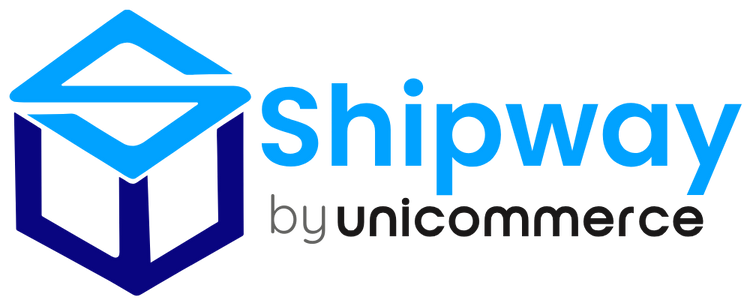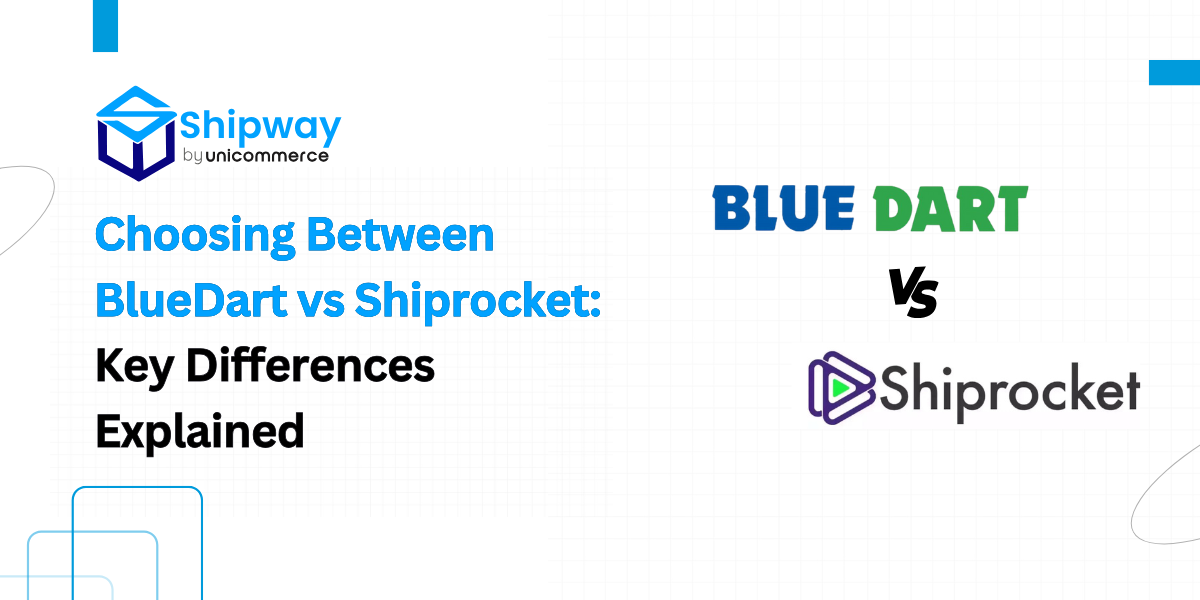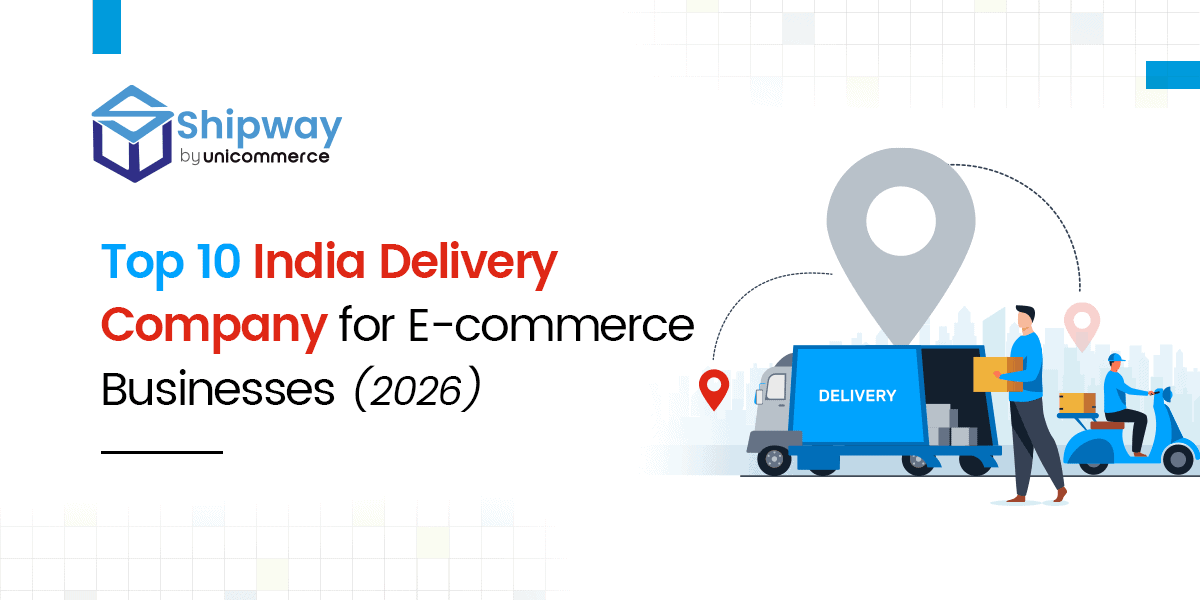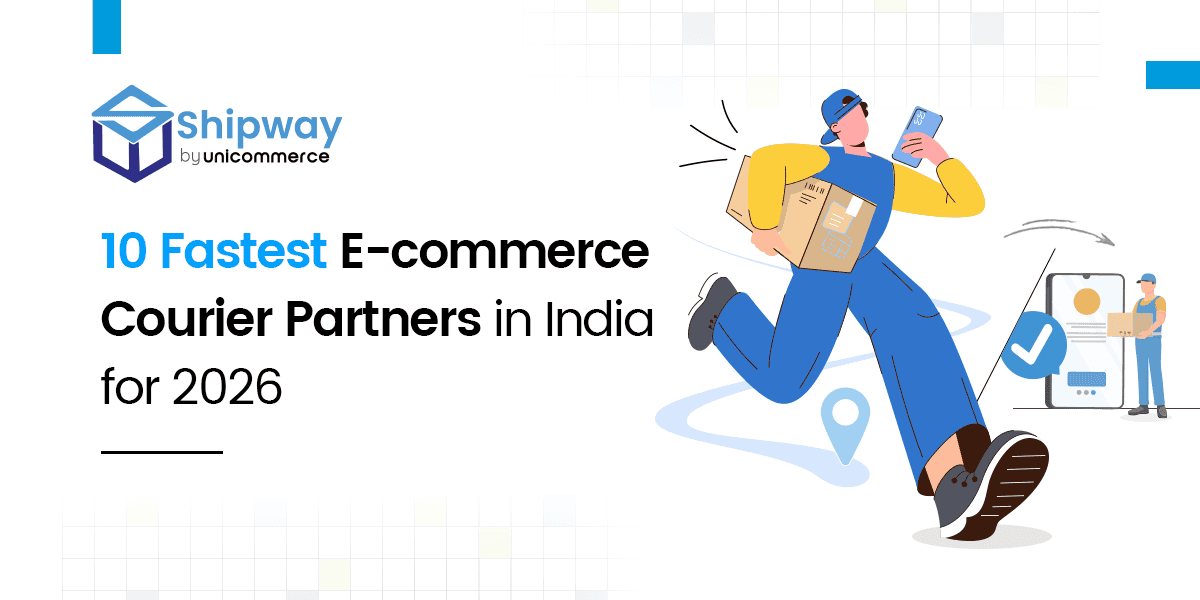Choosing the right shipping partner is a critical decision for any business involved in eCommerce. From delivery timelines and service reach to return handling and overall reliability, every detail matters.
Sellers often find themselves comparing logistics providers to identify the one that meets their operational goals, offers value for money, and supports long-term scale. Two names that frequently come up in this comparison are Blue Dart and Shiprocket. Both serve a wide customer base in India and support various shipping needs, yet they differ significantly in their roles as a logistics aggregator vs a carrier.
This article presents a side-by-side review of Blue Dart and Shiprocket based on core logistics parameters like delivery performance, RTO, weight dispute, pricing, tracking support, customer service, and return management. By examining how each platform performs across these metrics, sellers can identify which service aligns better with their business requirements.
We’ll also introduce a third option—Shipway—that is increasingly being chosen by online retailers looking for improved performance, wider courier access, and a more flexible solution. If you are new to ecommerce logistics or planning to switch providers, this comparison will help you understand how these platforms work in real-world shipping conditions.
Company Background
BlueDart
Blue Dart was established in 1983 and it is a top courier and logistics firm based in Mumbai. It is part of the DHL Group, which is widely known for its structured air and ground transportation setup across India. Its primary client base consists of large corporations and enterprises that ship high volumes and expect fast, predictable service.
Shiprocket
Since its establishment back in 2017, Shiprocket has quickly become popular among online sellers. It connects merchants with multiple courier companies, helping them manage deliveries more effectively based on shipping zones, pricing, and transit speed. Shiprocket is well-suited for sellers operating through eCommerce platforms like Shopify, Magento, WooCommerce, and Amazon.
Also Read: #1 Shiprocket Alternatives for Ecommerce
Comparison Table on Blue Dart Vs. ShipRocket Vs. Shipway
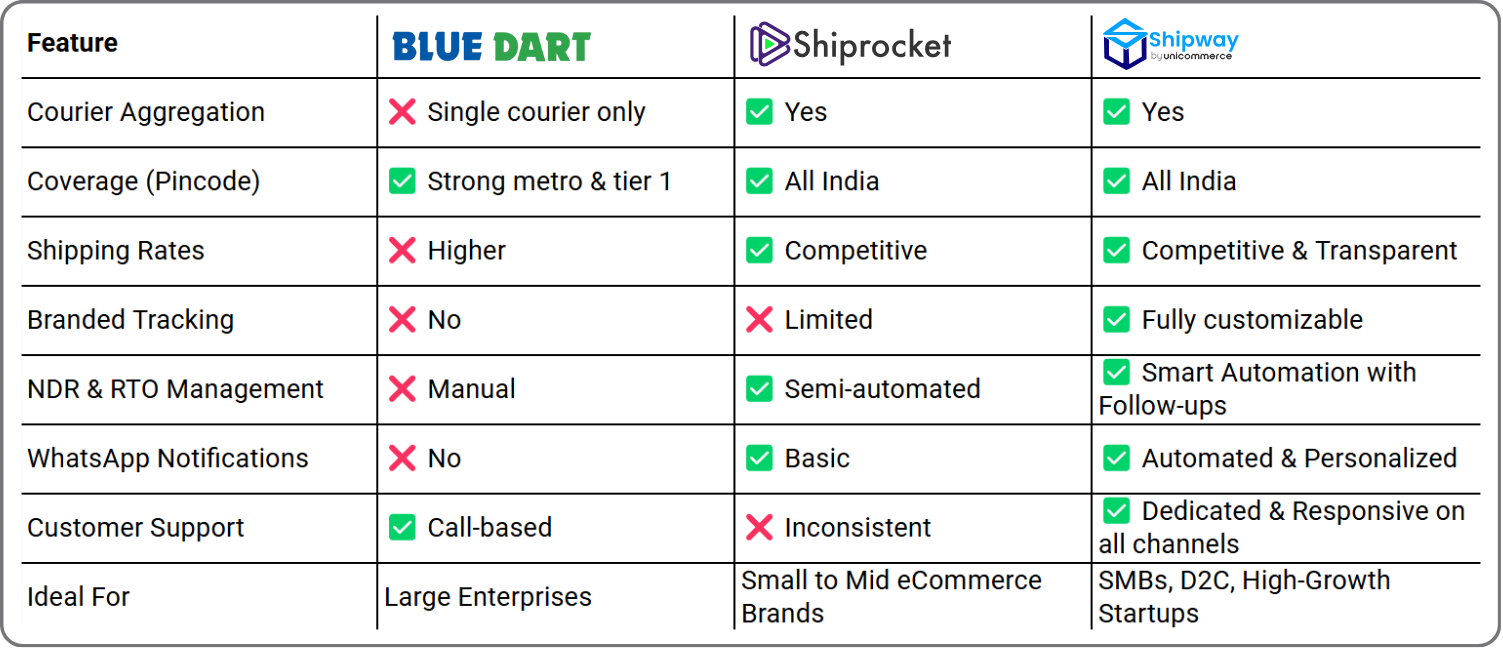
Delivery Reach & Network
Blue Dart reaches over 35,000 pin codes across India and can deliver to more than 220 countries through its parent network, DHL. It has a strong presence in metro cities and major urban areas that provide reliable intra-city delivery.
Shiprocket provides access to over 29,000 domestic pin codes via popular courier partners like Delhivery, XpressBees, DTDC, and Ecom Express. International delivery is supported, but service availability varies depending on the courier selected for each shipment.
Verdict
Blue Dart is popular due to its global express network and consistent service in the top cities of India. Shiprocket provides more flexibility for ecommerce businesses within India. It is used by sellers who need quick access to several courier providers through a single platform. Businesses with global needs may lean toward Blue Dart, while online sellers focused on domestic shipments and cost efficiency may find Shiprocket more suitable.
Delivery Speed
Blue Dart is best known for next-day and same-day delivery in major cities. Thanks to its dedicated air cargo fleet and high-volume corporate accounts, it can commit to guaranteed delivery timelines in many areas. It also provides time-definite services.
Shiprocket provides standard, express, and hyperlocal shipping options depending on the partner chosen. While express services are fast, they vary by courier, region, and volume commitment. Delivery speed on Shiprocket differs based on pin code, courier selection, and SLA policies.
Verdict: For guaranteed express deliveries, Blue Dart is more reliable. Shiprocket offers flexibility, but delivery timelines may vary, since it’s a third-party aggregator or middleman.
Courier Partner Flexibility
This is where Shiprocket excels. The platform offers access to over 25 courier partners through a single interface. Sellers can set rules based on price, delivery time, return rates, and other metrics to select the right courier per shipment.
Blue Dart operates as a single carrier. You work directly with them and do not have the flexibility to switch carriers without using an external aggregator.
Verdict: Shiprocket offers multi-carrier flexibility, which benefits businesses that prioritize cost optimization or want backup options during peak load periods.
Pricing & Cost Structure
Blue Dart usually provides rate contracts to businesses based on volume. Pricing is often fixed and suited to high-frequency shippers. For low-volume sellers or startups, the pricing may seem on the higher side.
Shiprocket has dynamic pricing based on courier, weight, destination, and service type. It is a more affordable shipping solution for startups, small businesses, and sellers who want to test different couriers before scaling.
Also, Shiprocket allows shipping at negotiated rates without signing individual contracts with every courier partner.
Verdict: Shiprocket provides better cost flexibility, especially for smaller businesses. BlueDart becomes more economical at high volumes.
Technology Features
BlueDart
- Offers API-based tracking
- Provides shipment creation via bulk Excel upload or integrated portals
- Track & trace is functional, but not as modern compared to newer platforms
Shiprocket
- Provides an intuitive dashboard for shipment creation, order syncing, and tracking
- Offers branded tracking pages and email/SMS updates
- Integrates with major platforms like Shopify, WooCommerce, Magento, Amazon, and Flipkart
- Provides return order management and NDR workflows
Verdict: Shiprocket has a more modern tech stack tailored to D2C brands and online sellers. Blue Dart is more functional for enterprises that prefer ERP integration.
Integrations with Online Platforms
Shiprocket is purpose-built for online merchants and its plug-and-play integrations with Shopify, WooCommerce, Amazon, and others make it a go-to platform for digital-first brands.
BlueDart does offer API integrations but lacks out-of-the-box compatibility with storefront platforms. Sellers will need technical teams or third-party developers to build custom integrations.
Verdict: Shiprocket is more plug-and-play. Blue Dart suits businesses that can build or manage custom APIs.
Return Management
Return handling is an essential part of the eCommerce supply chain.
- BlueDart provides returns as well, but it is more structured around its B2B logistics services and corporate clients.
- Shiprocket offers return pickup scheduling, branded tracking for returns, and analytics to monitor return frequency and cost.
Verdict: Shiprocket handles returns with more flexibility and automation for small to mid-sized online sellers.
Customer Support
Blue Dart provides support through dedicated account managers for enterprise clients. They also offer helplines and tracking portals. However, resolving shipment-level issues may involve more steps.
Shiprocket provides support through chat, email, and dedicated account managers for high-volume sellers. Since the platform works with multiple courier partners, resolution timelines depend on the partner involved.
Verdict: Both have structured support systems, but Shiprocket’s centralized panel simplifies issue reporting across couriers.
Shipping Volume Suitability
- Blue Dart is an ideal choice for high-volume businesses that require structured shipping processes and guaranteed timelines. Popular brands that ship thousands of orders per day use Blue Dart.
- Shiprocket is ideal for low to mid-volume sellers who want courier variety, flexibility, and quick onboarding without long-term contracts.
Verdict: Use Blue Dart if you’re scaling an enterprise-level operation. Use Shiprocket if you’re starting, testing new markets, or diversifying.
COD & Prepaid Support
Blue Dart supports Cash on Delivery (COD) across serviceable pin codes, but COD remittance cycles may be longer and less flexible compared to new-gen platforms.
Shiprocket offers COD as well as prepaid shipping, with faster COD remittance (often within 2–3 business days) and dashboards to track collections, returns, and reconciliations.
Verdict: Shiprocket has more real-time insights and flexibility for COD transactions.
Environmental Commitments
Blue Dart is an integral part of DHL Group reports on its sustainability goals that also include carbon offsetting and green supply chain practices.
Shiprocket partners with leading logistics service providers that provide carbon-neutral shipping or fuel-efficient fleets, but doesn’t operate fleets directly.
Verdict: Blue Dart has more control and visibility over environmental initiatives.
Scalability
Shiprocket allows you to start small and scale by adding couriers and automating order flow. It’s particularly suited for brands transitioning from marketplace selling to D2C models.
Blue Dart works best when scaling large operations with defined zones, product categories, and high delivery frequency. Onboarding is not as quick, but once active, it delivers consistency.
Verdict: Shiprocket enables faster onboarding. Blue Dart works best with structured growth.
Key Factors to Consider Before You Choose
Both providers, Shiprocket and Bluedart, have built strong reputations for different reasons. If your goal is to maintain control, speed, and quality across high-frequency deliveries, BlueDart is dependable. If you prefer flexibility, choice, and rapid scaling, Shiprocket brings versatility and digital readiness.
Some of the factors you should consider before finalizing a shipping service include:
- Cost-Effectiveness: Blue Dart offers premium reliability at a premium price. Shiprocket offers access to multiple couriers but may lack service control. Shipway offers value pricing with full transparency.
- Tech Features: Shiprocket offers automation but lacks customization. Shipway shines with branded tracking, automated returns, and smart NDR workflows — giving businesses control.
- Customer Experience: Shipway provides WhatsApp alerts, customized status pages, and faster support, improving the post-purchase experience — a key factor for repeat buyers.
- Returns & RTO: Shipway’s automated return workflows and proactive follow-ups significantly reduce RTO losses.
Looking for a third option? Shipping aggregators like Shipway are becoming increasingly popular by combining the best of both worlds — single dashboard control, wide courier selection, real-time tracking, and competitive pricing. They’re often used by businesses looking to reduce RTOs and improve customer experience while managing costs.
Conclusion: Why Shipway is the Better Choice
While BlueDart is perfect for time-critical deliveries and Shiprocket offers aggregation at scale, Shipway brings the best of both worlds with transparent pricing, customizable features, and automation tailored for growing eCommerce brands.
If you’re a D2C brand, SMB, or marketplace seller seeking better margins, smoother returns, and a consistent customer experience, Shipway delivers where it matters most.
Switch to Shipway and future-proof your logistics strategy.
You may also like…
Top 10 India Delivery Company for E-commerce Businesses (2026)
Choosing the right India delivery company is crucial for eCommerce businesses looking to provide fast, reliable, and cost-effective shipping. The...
read more10 Fastest eCommerce Courier Partners in India for 2026
Finding a fast delivery service in India has become essential for every growing eCommerce brand. With customer expectations rising rapidly, online...
read moreTop 10 Logistics Companies in India for eCommerce (2026 List & Guide)
Introduction: Why Logistics Matters for India’s Growing eCommerce Sector The Indian eCommerce sector has witnessed tremendous growth, projected to...
read more